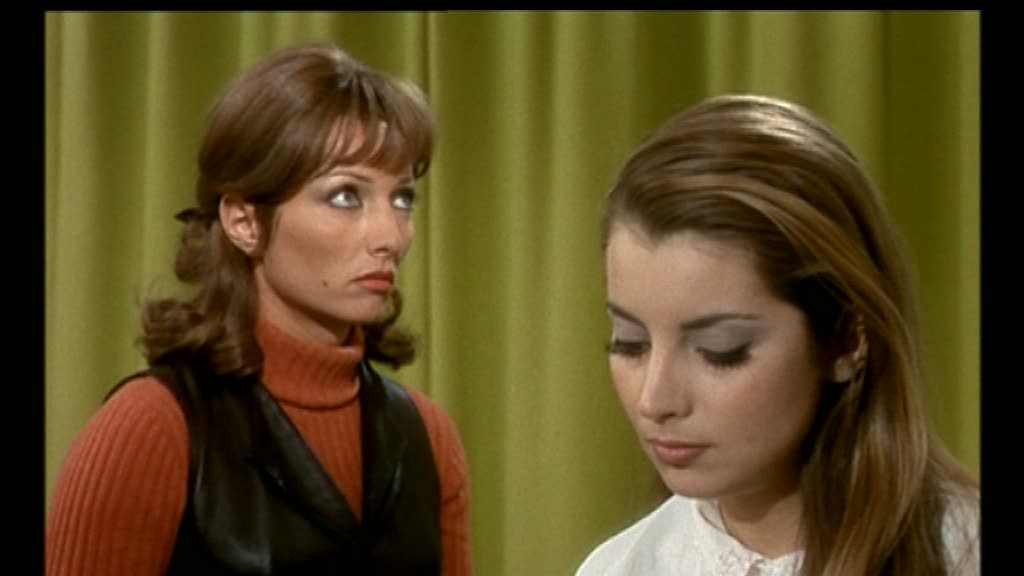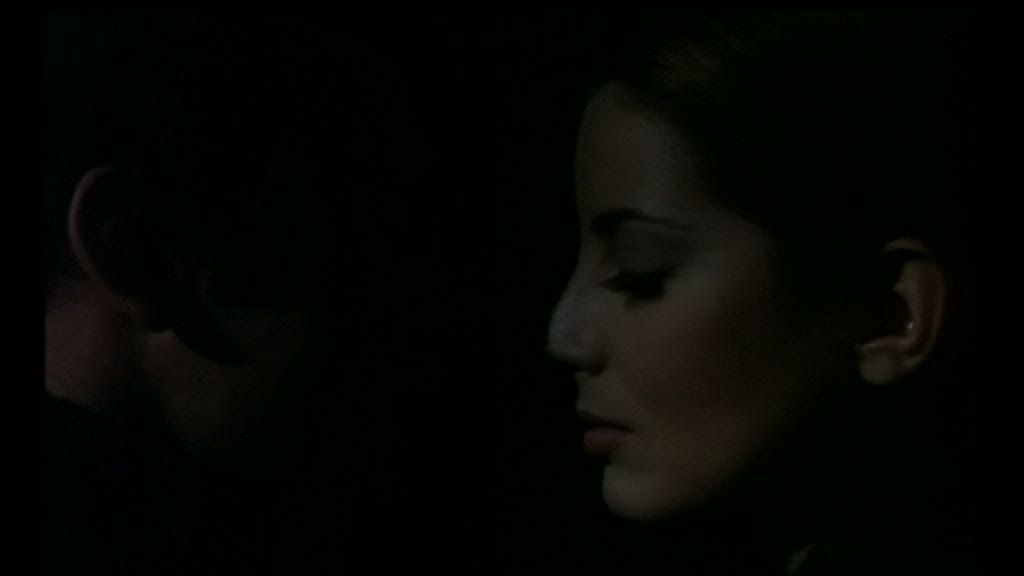
[This is a contribution to the Claude Chabrol Blog-a-Thon currently running at Flickhead from June 21 to June 30. For ten days, Flickhead will be dedicated to the works of the French New Wave master, and I'll be following along with many reviews of my own.]
Few directors have as acute an eye as Claude Chabrol for patiently observing and tracing the petty cruelties and shifts of power that run through intimate relationships. His best films seethe with the undercurrents of frustration, jealousy, revenge and betrayal that flow between those who know each other best. In Les biches, he methodically examines the complicated situation that develops when the rich, icy, controlling lesbian Frédérique (Stéphane Audran) takes in a younger protégé, the struggling young street artist whose only name is the enigmatic moniker Why (Jacqueline Sassard). Frédérique takes the younger woman to live at her palatial home on the water in St. Tropez, where she entertains the girl with lavish parties and engages her in a strange, ambiguous relationship: sometimes they're lovers, even husband and wife, while at other times a chilly master/servant dynamic develops between them. Frédérique takes the masculine role, unquestionably, dominating her young lover. At parties, she shows her off like a trophy, draping an arm around her and condescendingly patting her head. In bed, Frédérique dons glasses and reads the paper while Why sits off to the side, folded up into herself, docile and waiting.
Chabrol calls attention to the power dynamics inherent in relationships by eliminating gender from the equation, if only temporarily. This situation puts the emphasis on the markers of power within relationships: money, intellectual dominance, social status, experience. Frédérique initiates her inexperienced young lover into a new world and takes nearly complete control of her as a result. The situation changes with the introduction of the arrogant architect Paul (Jean-Louis Trintignant), who initially takes to Why and seduces her away from her master for an evening. Frédérique is both jealous and amused. Determined to toy with this new development for her own amusement, she instead finds herself falling in love with Paul, and as a result fluidly, almost naturally, entering the submissive role. It's a fascinating study in the shifting balance of power, as Paul worms his way into this home, disrupting its stasis, exerting some control for a change: he has Frédérique read books on architecture, his chosen field, making her the pupil and him the teacher, a 180-degree flip from her relationship with the malleable Why.
Chabrol's examination of this increasingly complex triangle is precise and analytical, as each point of the triangle pushes and pulls, trying to retain some control, some dominance. Such triangles are perhaps the perfect subject for Chabrol, whose filmmaking is nearly mathematical in its precision. His camera is constantly moving, but seldom with the languid grace of other filmmakers' tracking shots. His editing is abrupt and oblique, while his camerawork is angular rather than fluid, composed of many slow zooms into or out of a scene, slowly burrowing into a claustrophobic closeup or pulling back to an antiseptic distance, a vantage point from which to observe his characters writhe like specimens on a slide. This juxtaposition of discomforting intimacy with clinical objectivity is consistent with the mingling of hot and cold in the film's emotional palette. Chabrol accentuates the blank, non-committal faces of his two actresses especially, allowing them to betray few emotions behind their pretty, vacant expressions, their doll-like makeup and refusal to say what they really mean. Speech and feeling are totally disconnected here, as the two women profess to happiness and contentment while suffering from the very opposite. When Frédérique tells Why about her love for Paul, and the younger girl unfeelingly expresses her happiness for her friend, Frédérique says that she is relieved: "I was afraid you'd feel resentment." Of course, despite Why's words her tone is cold, deadly, dripping with resentment.

In this house where no one really means what they say, words mean little; it's looks and unspoken emotions that tell the real story. This idea is embodied most fully in Frédérique's two goofy henchmen/servants/hangers-on, Robèque (Henri Attal) and Riais (Dominique Zardi). These two clownish fools live in Frédérique's house, adding to the unstable atmosphere with their pranks and games and non-sequiturs. Alternately sinister and laughable, these two create a weird surrealist frisson around the fringes of the narrative, allowing Chabrol the leeway to smuggle in elements of slapstick farce, avant-garde performance art and referential word games into his sexual psychodrama. When Frédérique and Why first arrive at the villa, these two goofballs are reading revolutionary slogans from a Marxist book, gradually increasing the fervor of their proclamations, then throwing the book casually aside and running like eager schoolboys to meet their wealthy benefactress Frédérique, apparently without grasping the contradiction. Later, their dissonant music, played on a bizarre assemblage of drums, bells, whistles and glasses, fills the house with an absurd racket — "no wrong notes," one solemnly warns the other, before they resume pounding away with their defiantly un-rhythmic clamor. Spying on Why one night, Robèque and Riais become Clousseau-like buffoons, ostentatiously tip-toeing around through the darkness, ducking down behind bushes, and running around their car to switch seats when one of them proves utterly incapable of driving.
This nonsense enlivens and enriches the film, injecting a spirit of playful uncertainty into the proceedings. The central narrative is predictable in its progression, especially for those familiar with Chabrol and his idol Hitchcock — with the improbable introduction of a poisoned dagger early on in the film, it's obvious that it's going to wind up in someone's back sooner or later. With the narrative arc more or less constrained by the genre conceits, Chabrol bends and twists the film around this hard center, adding baroque touches and diversions around the central narrative.
He also delves deep into the subtleties of gesture that define the film's relationships, like the way Frédérique feigns drunkenness to nudge Paul into taking advantage of her, or the way Frédérique and Why, so similar they could practically be the same woman, semi-consciously fall into the same rhythms as they walk, their legs pistoning in tandem and their exhausted yawns escaping in sequence. Chabrol is a supple visual storyteller with a keen sense of symbolism, always skirting the obvious to suggest his story's darker undercurrents through elegant visual metaphors. The first kiss between Paul and Why is a prime example: she's on the right, he's on the left, both of them in profile, her face limned by light and his shaded in darkness. When he moves in, ever so slightly, to kiss her, her lips seem to be swallowed up by the darkness of his face, as though she were being devoured by a shadow.
Les biches is a taut, unforgettable psychodrama from one of the masters of the form. Its mysterious surfaces defy facile interpretation, offering up only glittering enigmas, like the shine of the button on Why's jeans as Frédérique undoes her pants for the first time, later mirrored in the glistening of the tears on the younger girl's face following her mentor's betrayal. Chabrol's art is chilly and abstract, designed to keep both viewer and characters at arm's length, and yet there are always dangerous emotions bubbling away beneath the surface, ready to boil over at any moment. This delicate balance of comfort and destruction within bourgeois life — and the ease with which it can be disrupted — is the essential subject of Chabrol's work.

6 comments:
Thanks for posting this, Ed, it's an excellent review. One other intriguing bit: Chabrol sets the film in St. Tropez -- in the winter!
Thanks, Ray. Good point about the wintery setting, which adds to the sense of isolation and quiet at the mansion, set in a heavy tourist area that empties out after the summer.
I'm enjoying the blog-a-thon so far, it's a great opportunity to explore a director who I've been meaning to dig into deeper for some time.
Les biches is a taut, unforgettable psychodrama from one of the masters of the form.
Yes indeed it is. It's one of my half dozen favorite Chabrols:
La Ceremonie
Le Boucher
Les Bonnes Femmes
La Femme Infidel
L'Enfer
Les Bitches
Nice post. I spent much of the time toward the end of Les Biches certain that Why would burn the St. Tropez house down, but the conclusion was satisfying on its own. The film reminds me of The Talented Mr. Ripley in the way Why learns to emulate and replace Frederique, and I agree with you about the importance of the gay friends. Without them, the central drama would be too arch and static. I found it also interesting that, as in Le Boucher, the male lead is ultimately less important than the females. Paul serves his purpose for the narrative, but he lacks the ambiguity of Frederique and Why.
A very elegant summation and analysis of the movie.
I liked how you made me see Paul as a more active agent in the film. I always tended to see him as almost a passive force, changing the dynamic of the two women but only with a partial awareness of the situation.
Well, that might be putting it a little strongly. I'm sure I saw Paul with some self-awareness and grasp of the situation but lets say I saw Frédérique as doing most of the running, merely choosing to change partners, having become bored with Why. I think you're right to credit Paul as a much more shrewd and self-assured character. One who has, to some extent at least, molded the situation to his own wishes.
Seeing that the P & F relationship mirrors the dynamic of F & W (though with a reversal of roles for F.), but on a deeper and more stable basis, is a much more satisfying way of viewing the film. It adds a symmetry to the movie that I saw lacking before. I suppose I never saw Paul as a player equal to Frédérique till now because Trintignant is at his most uncharismatic in this role. That particular piece of casting will remain in my mind one of the few flaws of the film.
Thanks for the comments, all.
CloudedYellow, Trintignant is definitely unlikeable here, but I don't think that's really a flaw: he's supposed to be a kind of rotten character, and he really gets across the blank amorality of his approach to women. Again and again Chabrol created ugly, amoral men like this and named them Paul; it's practically a recurring character throughout his work.
Post a Comment